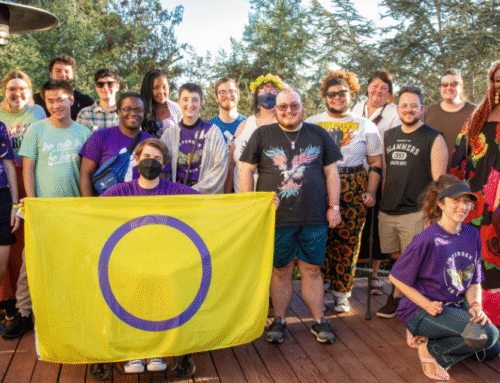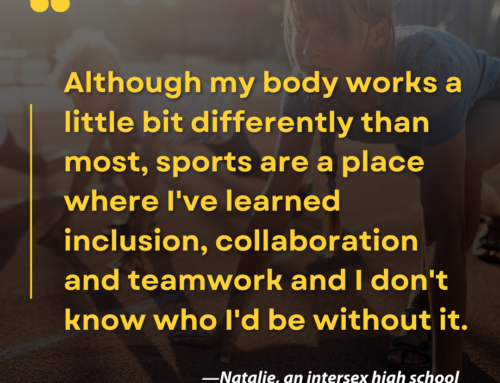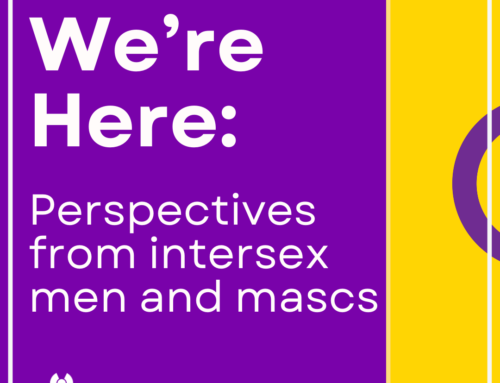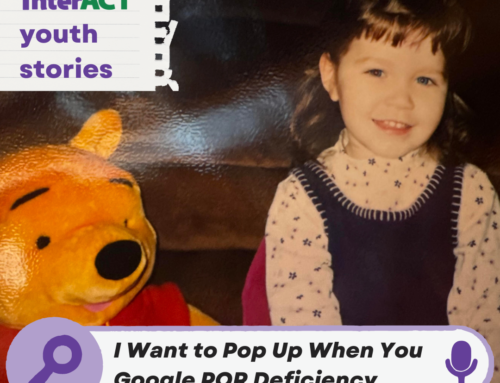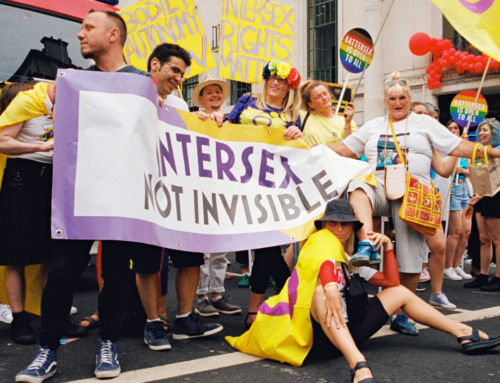
Anick and fellow intersex activist and interACT Youth member Irene at the Oii Europe 2018 Community Event in Copenhagen.
by Anick
I want you to imagine you are isolated, that you’ve got a secret you feel like you should hide because you fear no one could possibly understand you, or that they’d laugh at you and call you a freak. Now, what if this secret was a huge part of who you are, like for example your body. I was born with what society would deem to be “atypical” or “ambiguous” genitalia, it’s a secret which was kept between me, my family, and a few hundred doctors over the course of 21 years as I was subjected to several cosmetic surgeries to make me look like everyone else. I decided to expose my secret a couple of years ago when I came out as intersex. (Intersex is an umbrella term describing people born with biological sex characteristics that don’t fit the typical definitions of “male” or “female”sex.) I made this revelation fearing the worst but also in the hope that someday I’d be meeting other people who are like me.
Describing how I was feeling leading up to this moment is not very easy, but one thing I was feeling was anxious as I stood in the lobby of a hotel in Copenhagen. Over the next few days, I would be staying in Denmark to attend a conference organised by Organisation Intersex International (Oii) Europe; it would be the first time in my life that I would be meeting in-person a group of people who are also intersex. I couldn’t possibly even imagine how much I was about to learn at that point. I did not have any particular goals, and I didn’t know what to expect because this was going to be my first community event; there was part of me was hoping to meet people who had similar experiences to mine, simultaneously, another part of me was afraid that my expectations would fall short, that I’d walk away feeling even more misunderstood.
Admittedly, I thought I knew a lot about being intersex before last week because of my own experience but it would turn out that this was not true. Not all intersex stories are the same; not everybody who is intersex will know from birth, in fact, some people can go decades before ever realising. As the room filled up with strangers I couldn’t help but feel nervous. As a child, I never imagined that one day I’d be in a room and not be the odd one out. Looking around, I wondered how many of the people were also there for the same reasons as me, out of nowhere, I was approached by a stranger who wearing a beaming smile, walked towards me with open arms; a stranger who I would actually have quite a lot in common with. Turns out that Irene and I are both members of interACT which is an advocacy group for intersex youth. We’d never met each other before but we are both firm believers in the recognition of bodily integrity, consent, and rights of people who are intersex.
Turns out intersex people tend to be big huggers, we all approached each other with a familiarity and friendliness that I could not have anticipated. Maybe we were like this because it’s a situation in which we were all very similar and just for a short time, our anxieties could melt away and we could feel safe, we were no longer alone. I never had that support growing up because being who I was always felt like an act; a charade that society encouraged me to maintain. If only every day could be this way, a place where I am simply free to be me.
My own experience has been heavily medicalised, fraught with surgeries and a desire to be anyone but myself. During a workshop on ‘regional realities’, I discovered just how comparable all our experiences were, despite our intersex variations being so different. Over the course of a few days, I had the great pleasure of meeting people from around the world who all share their own version of my secret. It was a safe space in which over fifty of us of all ages, the youngest being nine, coming from 25 different countries were able to confront our own attitudes, thoughts, and opinions, and learn how we can turn our stories into something meaningful to help stop intersex invisibility.
What really hit home is that my specific story is not a universal one. While I am certainly the expert of my own experience – simply growing up with an intersex variation does not necessarily make someone an intersex expert. I will look back at this as an incredibly defining moment in my life and whilst I’ve previously described myself as being intersex, this event is perhaps the first time I’ve truly understood what that term meant. Being intersex for me is now a process of unlearning all I thought I knew and listening to the stories of those who like me, are working towards creating a better future. As I continue to work as an intersex activist, I do so with the help of an inclusive and supportive global community.

interACT Youth members Anick and Suz at National Student Pride 2018 in London.
Anick is a 22-year-old U.K. based intersex activist and member of interACT Youth with a degree in Law and a passion for equality. His story is being explored in a documentary by BBC Radio 1/iPlayer which is following him on an important journey of self-discovery of what it means to be intersex. Find him on social media @anickians


